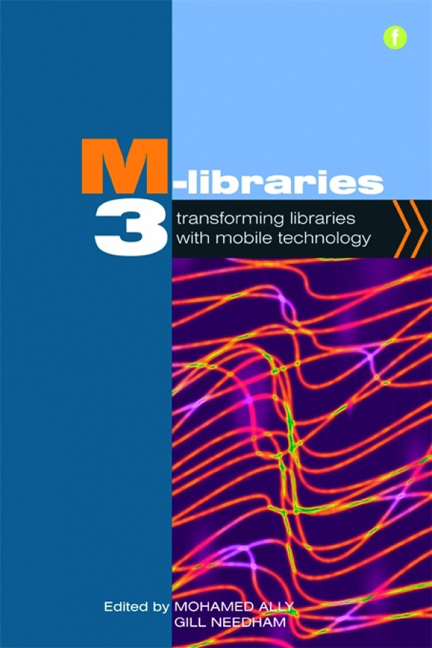Book contents
- Frontmatter
- Contents
- Acknowledgements
- Contributors
- Foreword
- Introduction
- 1 Education for all with mobile technology: the role of libraries
- PART 1 DEVELOPING MOBILE SERVICES
- PART 2 PEOPLE AND SKILLS
- 9 Staff preparedness to implement mobile technologies in libraries
- 10 Apps and attitudes: towards an understanding of the m-librarian's professional make-up
- 11 There's a librarian in my pocket: mobile information literacy at UTS Library
- 12 Exploring student engagement with mobile technologies
- 13 It's just not the same: mobile information literacy
- 14 The students have iPods: an opportunity to use iPods as a teaching tool in the library
- PART 3 FOCUS ON TECHNOLOGY
- Conclusion
- Index
14 - The students have iPods: an opportunity to use iPods as a teaching tool in the library
from PART 2 - PEOPLE AND SKILLS
Published online by Cambridge University Press: 08 June 2018
- Frontmatter
- Contents
- Acknowledgements
- Contributors
- Foreword
- Introduction
- 1 Education for all with mobile technology: the role of libraries
- PART 1 DEVELOPING MOBILE SERVICES
- PART 2 PEOPLE AND SKILLS
- 9 Staff preparedness to implement mobile technologies in libraries
- 10 Apps and attitudes: towards an understanding of the m-librarian's professional make-up
- 11 There's a librarian in my pocket: mobile information literacy at UTS Library
- 12 Exploring student engagement with mobile technologies
- 13 It's just not the same: mobile information literacy
- 14 The students have iPods: an opportunity to use iPods as a teaching tool in the library
- PART 3 FOCUS ON TECHNOLOGY
- Conclusion
- Index
Summary
Introduction
This case study is about making the most of an opportunity, combining a traditional library introduction lesson with available mobile technology. Shepparton Campus of La Trobe University, situated in central Victoria, Australia, has a Diploma of Education programme; all students in 2010/11 were lent an iPod Touch for their year of study. The librarian needed to introduce library services to the students, as a large group, in a short period time. What better way than to make use of the iPods? The result was an easy lesson in both preparation and delivery for the librarian. Students found the session informative and entertaining. Novice iPod users were challenged to improve their skills and competent users were quickly using their iPods to navigate the library website.
iPods in libraries
One of the top ten trends identified in academic libraries in 2010 was that the ‘explosive growth of mobile devices and applications will drive new services’ (ACRL, 2010). University students, amongst whom ownership rates are high, expect to be able to access their institution's services easily, including the library. To meet such user expectations, librarians are being encouraged to think creatively by taking into account users’ needs and preferences. Librarians making use of iPods is an example of ‘leveraging the technology that their patrons use … to deliver robust new services without making users leave their comfort zones’ (Kroski, 2008, 33).
McDonald and Thomas (2006) contend that libraries have actually done ‘little to embed themselves and their resources into the everyday tools, spaces and activities important to today's learners’. They identify this as a ‘disconnect’ with ubiquitous hand-held access. This paper outlines one exploration of alternatives for the delivery of library information literacy skills.
The use of mobile devices for information literacy can be seen as an extension of Web 2.0, described as a ‘crucial deficit area’ on account of the limitations of the technology and the variety of devices owned (Godwin, 2010). Despite the perceived difficulties, other librarians are also experimenting. Cairns and Dean (2009) describe using iPods to ‘deliver some of our most basic freshman level library instruction to students’. Further explorations of iPod use in the library setting include development of the library tour as a podcast targeted to a specific audience (Lee, 2006), pre-loaded iPods for loan for listening assignments, or uploading educational podcasts to iTunes University, where an increasing range of materials are available free of charge.
- Type
- Chapter
- Information
- M-Libraries 3Transforming libraries with mobile technology, pp. 119 - 126Publisher: FacetPrint publication year: 2012



